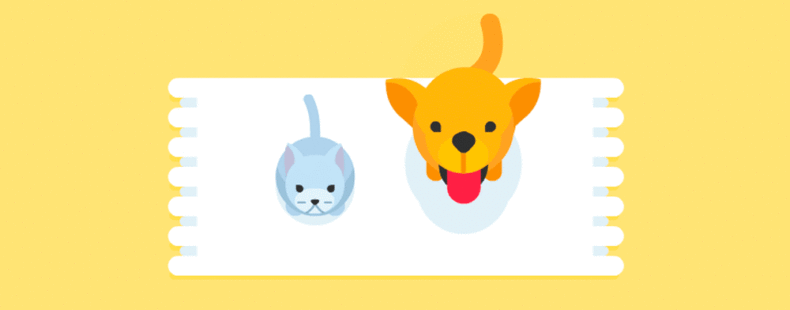To start, we’ve rounded up our favorite animal-inspired words in one short and sweet video. Take a look.
Words You Didn’t Know Were Inspired By Animals

Schlong
Continuing on and keeping it classy; schlong derives from the Yiddish shlang, meaning “snake” or “serpent.” Not too hard to see why the word became English slang (shlang?) for “penis” in the year—get this—1969.

Arctic
The word arctic comes from arktos, the Greek word for “bear.” But, giant polar bears roaming the arctic tundra aren’t the bears in reference; rather, it’s the beautiful constellation Ursa Major (“Great Bear”) in the night sky above.
Before arctic described the northernmost region of the globe, the adjective referred to the celestial regions above the sparkling night sky. Beautiful!

Sturdy
Today, we think of a sturdy bed frame as being “robust” and “strongly built.” Seven hundred years ago, a sturdy frame would have been “hard to manage” and “reckless” (it was going through its teenage angsty phase and hated people getting on its back all the time).
The word possibly derives from the Latin turdus, the dull brown and speckled songbirds we now call thrushes. One origin narrative explains that thrushes pecked fermented grapes left over from winemaking and would become drunk. In their loopy state, they’d behave “recklessly,” ransack the fridge, leave the door open all night, and pass out on the couch. The French expression soûl comme une grive, “as drunk as a thrush,” seems to corroborate this.
How sturdy ever got sober—that’s a story for another day.

Bawl
Have you ever thought that when a person bawls, it sounds like a barking dog? If so, you’re on to the Latin origins of this word.
In Latin, baulare meant “to bark like a dog,” and when the word was first adopted into English, it was only used in reference to man’s best friend. But, because distressed human beings can sound so much like dogs when they gulp for air and woof sobs of sadness, bawl is now a verb used to describe crying.

Burrito
Unless you speak Spanish, the last time you bit into a burrito, you probably didn’t realize the the word means “little donkey.”
But, don’t worry, donkey meat wasn’t originally rolled into the wrap; one legend has it that a Mexican taco vender traveled by donkey and wrapped tortillas around the food to keep it warm.

Butcher
A butcher makes a living slaughtering animals to sell for meat, all kinds of animals. But, the word butcher originally referred to only a single animal: the goat.
From the Old French bochier (boc meant “goat”), butcher literally meant “slaughterer of goats.” Not surprising to see animal inspiration behind this word, right?

Canopy
In some places, mosquitos are so bad a canopy of netting is installed around beds to keep the menaces from aggravating sleepers.
Similarly, Ancient Greeks built kanopeions, “couches with mosquito curtains,” to block the konops, “mosquitos.” By the time the word canopy was assimilated into English in the late 1300s, it referred only to the curtain and not the couch-and-curtain ensemble.

Capricious
A capricious person is unpredictable and acts on a whim. Italian goats (capros) are the original capricious creatures. They so adore frisking about and romping whimsically through the countryside that they inspired the Italian word capriccioso (“whimsical”), which gave rise to capricious in 1600.

Sniper
Back in the 1800s, it was popular to hunt snipes, or long-billed birds notorious for being jittery and flying at high speeds—making them one of the most difficult game birds to shoot.
Moving too close to them would really ruffle their feathers and ruin a good shot, so the only way a sniper (snipe hunter) could possibly hit the bird was from a distance, hidden out of sight.

Cynic
If a dog’s skeptical or distrustful of her owner, she wouldn’t be an adulator wagging her tail—she’d be a cynic.
From the Greek kynikos, meaning “dog-like”, cynic was first used in reference to a group of Ancient Greek followers of a philosopher named Antisthenes. Maybe the cynic philosophers were sneering and sarcastic in their debates, but the name likely comes from Kynosarge, “Gray Dog,” the name for the philosophers’ meeting place. The cynic as “sneering sarcastic person” came later, in the late 1500s.

Hackneyed
Fans of British dramas may know that hackneys were the Ubers of centuries past. The word originates from the Old French haquenée, or a docile horse suitable for the dainty and delicate dispositions of the fairer sex.
Hackney then came to describe any horse hired out for service (along with the coach or carriage it was attached to). Poor hackney horses suffered through the drudgery of hard and incessant labor, pounding the streets every day until they were used up. By extension, anything that’s hackneyed reflects that sense of wearied, worn-out toil.

Tragedy
Replacing the word tragedy with its Ancient Greek meaning turns tragic comic: “It was such a goat song the way Romeo and Juliet both die at the end!” “Goat song”? Yes, that is indeed what tragoedia means (from tragos, “goat” and oide, “song”).
Numerous conjectures try to explain this peculiar meaning; some say the earliest tragic plays were performed by actors dressed in goatskins; others relate the meaning’s origins to the fact that the goat was the sacred animal of Dionysus (the god of theater) and tragedies were the first plays created in the god’s honor.

Tyke
“Come here, you little tyke!” Cue a big bear hug (and maybe a loving noogie on the noggin) from an uncle or grandfather.
From the Old Norse word tik, meaning “female dog,” tyke became an insult at one time, meaning a “low-bred or lazy man.” It regained its childlike innocence at the beginning of the 20th century.

Dandelion
The hidden meaning isn’t so hidden in dandelion. Dent de lion, or “lion’s tooth,” was the original French name for the perky weed because the spiky leaves were thought to look like lion’s fangs.

Henchman
The English language reflects how horses are some of the most important animals in the history of transportation. In Old English (via Dutch and German), hengest meant “horse” or “stallion.” The hengestman (“horseman”) was a knight or servant who traveled alongside a nobleman on horseback. This means that, for about 500 years starting in the 1300s, henchmen were trusted attendants.
It wasn’t until the 1800s that the sense of henchman as “unscrupulous criminal” came about, probably due to a mistranslation of the original meaning.

Cavalier
From the Old Italian cavallo (“horse”), and cavalliere, (“mounted soldier or knight”), cavaliers were armed knights on horseback. Knights were supposed to be courageous and gentlemanly, so at first (centuries ago), the adjective cavalier meant “knightly, brave, gallant.”
But, over time, it seems the riders became too high and mighty on their horses, hence the modern-day adjective meaning “haughty or disdainful.”

Bellwether
Silicon Valley is a bellwether of the tech industry. Audrey Hepburn was the bellwether for the LBD (the “little black dress”).
A bellwether is a frontrunner or trendsetter in a professional or social context. Strangely, it’s also “an emasculated male sheep.” In Medieval shepherding, the wether—Old English for “castrated ram”—led the flock and could be identified by the bell around its neck.

Hobby
Also related to the noble equine, a hobby in the 1400s was a “small, active horse,” perfect for pulling a cart. The name for the small horse easily lent itself to describe a tiny toy horse in the word hobbyhorse.
Hobbyhorses are fun but they don’t go anywhere, which is exactly the sense that hobby came to pick up next: a favorite pastime that “doesn’t go anywhere,” or that isn’t one’s main (and very serious) occupation.

Pavilion
Ever been to a concert at a pavilion, or an outdoor structure that provides some shelter overhead while being open to the light, air, and nature around it?
From the Latin words for “butterfly” (papilionem, papilio), these structures began as “large, stately tents,” with durable fabric unfurled like butterfly wings above people’s heads.

Bucolic
Remove the bucolic scenes of quaint pastures and countrysides from the history of art, and you’ll be left with a gaping black hole of history and culture.
This word describes anything related to the romanticized, rustic life of a shepherd. Though instead of relating to sheep, bucolic comes from the Greek boukolos, meaning “cow herdsman.” Most artists painting bucolic scenes include at least a couple of happy bous (“cows”).

Pedigree
It’s hard not to associate pedigree with dogs. But surprisingly, pedigree related to cranes way before dogs.
The term comes from the Old French expression pied de gru, meaning “foot of a crane.” In old genealogy charts, ancestral “descent” (or your personal pedigree) was represented by a forked symbol that resembled a crane’s footprint.











